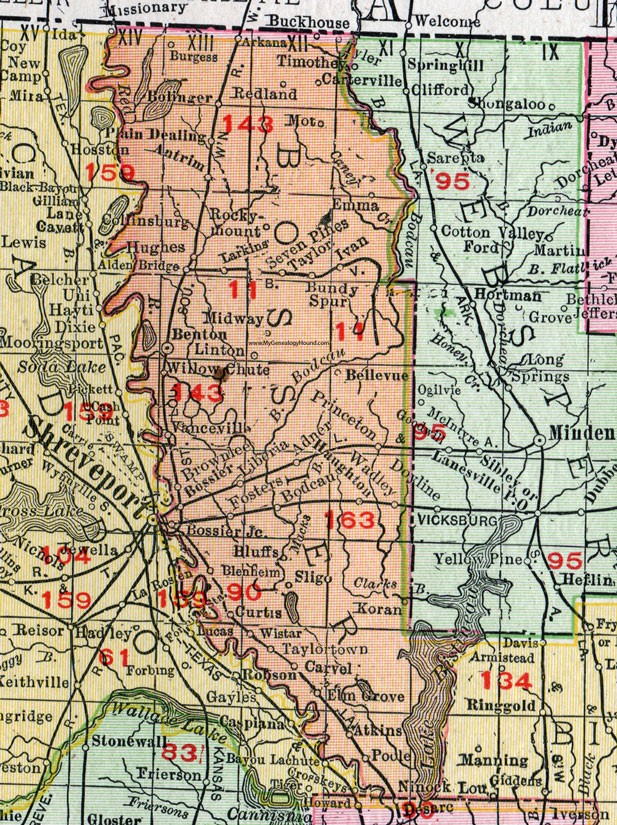Today, June 19th, is a newer state and federal holiday to commemorate Juneteenth, but the holiday has a long history of being celebrated in Bossier Parish. Juneteenth, recognizes the day in 1865 when the enslaved men & women in Galveston, TX learned that they were free, two and a half years after the Emancipation Proclamation, and Federal troops were sent to enforce the proclamation.
Historically, Juneteenth has often been considered a “Texas holiday,” though newspaper articles going back to the late 19th century give evidence of the holiday’s celebration among African-American residents of Bossier Parish, either celebrating in the parish or taking advantage of the local railroads’ discount tickets to join regional celebrations, such as in Boyce, LA or Stamps, AR. Most of the 19th century to mid-20th century local newspapers refer to the holiday as Emancipation Day. You may also sometimes hear the holiday called Jubilee Day, Freedom Day or Liberation Day.
The “Shreveport Times” on Tuesday, June 29, 1917, announced, “While the negro population of Shreveport is celebrating Emancipation Day, they will not have anything on the ‘country,’ for the farm hands and negro farmers of the parish are, in their own way to have as big a celebration as their neighbors in the city. Picnics, dances barbecues, speech-making and other means of observing the day have been arranged for on an elaborate scale.”
The biggest of all of these “country” celebrations, the Times noted, was to be in Bossier Parish on the Liberia Plantation. Mrs. Olive Foster, the owner of the planation, had “taken charge of arrangements” for the celebration on the large Bossier plantation (1400 acres in Ward 2 of Bossier Parish. Numerous present-day subdivisions have been carved out of it in Bossier City and the Red Chute area of Haughton) and the Times guaranteed it to be “the biggest party yet” for the attendees.
The festivities would start at 4:00 PM with a baseball game between the Liberia team and a team from adjoining plantations. Mrs. Foster supplied uniforms and equipment for both teams. Following the game, several of the Liberia workers were to present a vaudeville-style program. Two-thirds of the money taken for tickets to both the game and the show would be donated to the local Red Cross. Following the show would be a dance, while refreshments would be served all day to “keep down summer temperatures. ” However, the grove on the plantation was expected to lend lots of cool shade. The Times reported that in addition to the African Americans “for miles around” who were expected to attend, it was anticipated that many local white residents would visit Liberia Plantation on Juneteenth, especially the ball game, as spectators.
The “Bossier Banner-Progress” newspaper wrote that about five or six hundred celebrants gathered at Princeton for a big barbecue and baseball games. In 1924, the “Bossier Banner” wrote of a large Emancipation Day party held in the Seven Pines community, which is several miles northeast of Benton, that featured barbecued meats, music, and dancing. In 1934, the “Plain Dealing Progress” reported that no less than five hundred people attended an Emancipation Day gathering to participate in ball games, dances and other celebrations.
In an oral history interview, Rev. Carl Hawkins, who grew up in Bossier Parish in the 1930s & 40s, notes that, "We would have picnics and barbecue; most of the churches would have some type of activities going on." Bessie Rhodes, in her oral history, remembers baseball games on Juneteenth in the 1930s.
"The 19th of June was our celebration and I loved the ballgames. We’d have a big old thing!" John Williams considered the meal served on June 19th, when he was growing up in Koran, as his family’s equivalent of a Thanksgiving feast.
Come get out of the heat and visit the History Center to share your own family’s stories of Juneteenth, or peruse our oral history or newspaper collections to discover more stories. The Bossier Parish Libraries History Center is located at 2206 Beckett St, Bossier City, LA. We are open M-Th 10-8, Fri 10-6 (but CLOSED next Friday, 6/16/2023), and Sat 10-5. Our phone number is (318) 746-7717 and our email is history-center@bossierlibrary.org
For other fun facts, photos, and videos, be sure to follow us @BPLHistoryCenter on FB, @bplhistorycenter on TikTok
Images:
- T. Olive Foster from The Tennessean, Feb. 5th, 1899
- Rand McNally 1911 Map of Bossier Parish which shows Liberia Plantation in roughly the center of the parish.
- Unidentified man playing baseball in Bellevue area, Bossier Parish, C. 1930. Photo courtesy of Mrs. Leona Raymond and the Bossier Parish Libraries History Center



This was a very informative article. Thank you Pam.
ReplyDelete